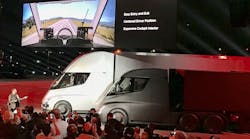HAWTHORNE, CA. Tesla finally unveiled its long teased electric Class 8 truck on Nov. 16, which CEO Elon Musk said has a 500-mile range and will result in “economic suicide” for fleets that stick with traditional diesels.
“It blows my mind – I think it will blow yours,” Musk said as he emerged from one of the two prototype Semi day cabs.
As he addressed a raucous crowd that resembled a rock concert more than a truck unveiling, he spent 30 minutes outlining the reasons he believes this vehicle will revolutionize trucking when it hits the road in 2019.
The 500-mile range, Musk said, is a worst-case scenario, based on being full loaded and traveling at maximum highway speeds.
“You can get to your destination and back, even if your destination has no charging,” Musk said.
With use of megachargers, a new high-speed charging solution, truckers can add 400 miles in 30 minutes. The chargers can be installed at origin or destination points, and along heavily trafficked routes.
Musk did not take questions from the media or disclose a purchase price. However, he declared the Semi has “the lowest cost of ownership,” with an estimated cost of $1.26 a mile at a guaranteed 7 cents per kilowatt hour, compared with an average of $1.51 a mile for a conventional diesel.
A Tesla fact sheet said “owners can expect to gain $200,000 or more in savings over a million miles based on fuel costs alone.” Musk added the cost of ownership is nearly half of diesel trucks when the Semis are linked in a platoon.
Musk not only called it “economic suicide” to use a diesel truck, but said the economics of the Tesla Semi outperform freight railroads as well.
Throughout his presentation, he took numerous shots at the overall appearance and performance of today’s conventional trucks.
He said the Tesla Semi goes from 0 mph to 60 mph in 5 seconds without a trailer, compared with 15 seconds for a diesel. It climbs 5% grades at a steady 65 mph, while diesel trucks max out at 45 mph. That makes a “gigantic difference” for truckers who are paid by the mile, he told the audience made up largely of Tesla car owners.
The improved performance is achieved by the vehicle’s “bullet-shaped nose,” completely flat bottom, and reduced gap between the tractor and trailer.
The truck has four Tesla Model 3 electric motors – one for each rear wheel. With no shifting or clutching there is smoother acceleration and deceleration, and its regenerative braking recovers 98% of kinetic energy to the battery, giving it a basically infinite brake life, the company said.
The roomy interior is also quite different than trucks currently available, including a driver seat positioned in the center.
Musk said the centered seat and camera system provide complete visibility of the roads, while two large screens next to the steering wheel provide navigation and other data truckers need while on the road.
Every Semi will come standard with “enhanced autopilot,” including emergency braking, lane keeping assist, and collision avoidance.
Onboard sensors that detect instability and the vehicle’s lower center of gravity means “jackknifing is impossible,” Musk said.
Among the loudest reactions from the crowd came from Musk’ declaration the truck will “not breakdown for 1 million miles.”
Even if two of the four motors break down, the truck will keep running and will “still beat a diesel truck.”
If there are any problems, it will be detected by Tesla’s remote diagnostics service, similar to the many “uptime” features offered by existing truck and engine manufacturers.
One problem truckers should not expect is a cracked windshield, thanks to glass that is thermonuclear explosion proof, Musk claimed, noting that was his favorite feature.
And much as you might expect from a rock concert, just when it appeared to be was over, there was an encore: a new Tesla Roadster emerged from one of the trailers, drawing the loudest reaction of the evening.






